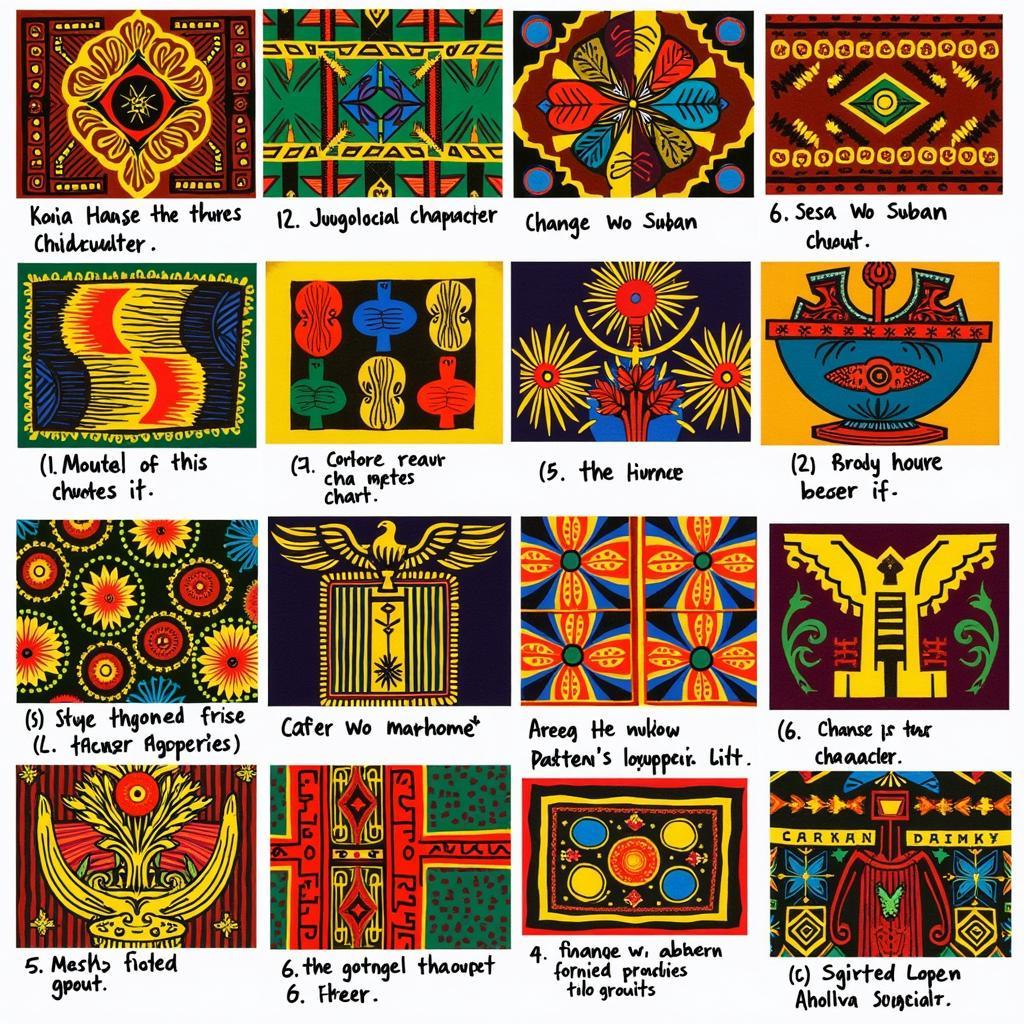Exploring the Vibrant World of African Kente Cloth
African Kente Cloth, a vibrant and intricately woven textile, represents more than just beautiful fabric. It’s a visual language, a symbol of prestige, and a testament to the rich cultural heritage of the Ashanti people of Ghana and the Ewe people of Ghana and Togo. From its origins steeped in legend to its contemporary uses in fashion and art, kente cloth tells a powerful story of tradition, creativity, and identity.
The artistry of kente cloth lies in its intricate patterns, each imbued with symbolic meaning. These geometric designs, woven with colorful silk and cotton yarns, represent proverbs, historical figures, social values, and even philosophical concepts. Owning and wearing kente cloth has historically been a privilege, reserved for royalty and those of high social standing, further emphasizing its cultural significance. Learn more about african kente symbol.
A Royal Legacy: The History of African Kente Cloth
The origins of kente cloth are shrouded in legend, adding to its mystique. One popular story tells of two brothers, Kurugu and Ameyaw, who learned the art of weaving by observing a spider spinning its web. Inspired by the spider’s intricate work, they created the first kente cloth, presenting it to their king, who was so impressed he declared it the royal cloth. Regardless of the exact origin, it’s clear that kente weaving developed over centuries, becoming a highly specialized craft passed down through generations.
Another story suggests that the word “kente” is derived from the Akan word “kenten,” meaning basket, likely due to the cloth’s resemblance to woven basket patterns. This etymology hints at the ingenuity and resourcefulness of the Ashanti weavers, who transformed everyday materials into exquisite works of art.
Decoding the Patterns: Understanding African Kente Symbolism
Each design in kente cloth holds a specific meaning, adding another layer of depth to its artistry. For instance, the popular “Nyame Nti” pattern translates to “by God’s grace,” reflecting a deep sense of faith and spirituality. Other patterns represent important concepts like leadership, wisdom, and unity. This intricate language of symbols makes kente cloth a powerful form of non-verbal communication, expressing complex ideas and beliefs through visual art. Explore different african kente cloth styles.
 African Kente Cloth Patterns and Their Symbolism
African Kente Cloth Patterns and Their Symbolism
What are the different types of Kente cloth?
There are numerous types of kente cloth, each distinguished by its unique patterns, colors, and weaving techniques. Some common variations include:
- Asante Kente: Known for its vibrant colors and bold geometric patterns.
- Ewe Kente: Often features more intricate designs and a wider range of colors.
- Nzema Kente: Typically uses darker colors and simpler patterns.
How is African Kente Cloth Made?
The creation of kente cloth is a labor-intensive process, requiring skill and patience. Traditionally, men operate narrow strip looms, meticulously interlacing silk and cotton threads to create the intricate patterns. These strips are then carefully sewn together to form larger pieces of cloth, used for garments and other ceremonial purposes.
From Royalty to Runways: African Kente Cloth Today
While kente cloth retains its traditional significance in Ghana and Togo, it has also gained global recognition as a symbol of African heritage and artistry. From high fashion runways to home décor, kente-inspired designs have permeated various aspects of contemporary culture. This global embrace speaks to the enduring power and beauty of this ancient textile. Find great deals on african inspired dresses sale.
“Kente is more than just cloth,” says Kwame Asante, a renowned Ghanaian textile historian. “It’s a living testament to the creativity and ingenuity of our ancestors, a tangible connection to our past, and a symbol of our enduring cultural identity.”
Where can I buy authentic African Kente Cloth?
Authentic kente cloth can be purchased directly from weavers in Ghana and Togo, supporting local artisans and ensuring the preservation of traditional techniques. You can also find reputable online retailers specializing in African textiles.
In conclusion, African kente cloth is much more than a beautiful fabric; it’s a living embodiment of Ashanti and Ewe culture, history, and artistry. From its royal origins to its contemporary uses, kente cloth continues to inspire and captivate, reminding us of the rich heritage and creative spirit of Africa.
FAQ: Frequently Asked Questions about African Kente Cloth
- What is the significance of the colors in kente cloth? Each color holds symbolic meaning. For example, gold often represents royalty and wealth, while blue signifies love and peace.
- Can anyone wear kente cloth? While traditionally reserved for royalty and special occasions, kente cloth is now widely appreciated and worn by people of diverse backgrounds.
- How do I care for kente cloth? Hand washing or dry cleaning is recommended to preserve the vibrant colors and intricate weaving.
- Is kente cloth only used for clothing? While commonly used for garments, kente cloth is also used for accessories, home décor, and artwork.
- Where can I learn more about the history of kente cloth? Numerous books, museums, and cultural centers offer in-depth information on the history and significance of kente cloth.
- What is the difference between Ashanti and Ewe kente? While both are beautiful and intricate, Ashanti kente tends to feature bolder geometric patterns and brighter colors, while Ewe kente often incorporates more intricate designs and a wider range of colors.
- Are there any modern interpretations of kente cloth? Contemporary artists and designers are constantly finding new and innovative ways to incorporate kente patterns and colors into their work, creating a dynamic fusion of tradition and modernity.
“Kente is a powerful symbol of our heritage and a source of immense pride,” adds Abena Osei, a kente weaver from Ghana. “It’s a privilege to continue this tradition and share its beauty with the world.”
You might also be interested in learning about african bug booties or african american tea party attire.
For any assistance, please contact us at Phone: +255768904061, Email: [email protected] or visit our address: Mbarali DC Mawindi, Kangaga, Tanzania. We have a 24/7 customer service team.
